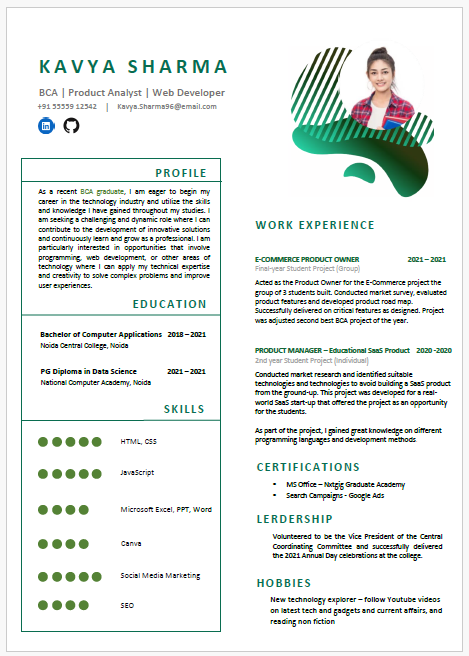Web Developer
BCA

About this template
This resume is tailored to make a strong impression and increase your chances of landing your desired job.
This template is made in MS Word so, users can easily customize it to fit their specific needs.
Some important and common interview questions for BCA, Web Developer
For a BCA graduate interviewing for a web developer position, there are several common and important interview questions that help assess technical knowledge, problem-solving abilities, and familiarity with web development practices. Here are ten frequently asked questions:
1. Can you explain the difference between HTML and HTML5?
This question evaluates your understanding of web markup languages. HTML5 introduces new elements and attributes that enhance the functionality and structure of web pages, such as semantic elements, multimedia support, and improved APIs.
2. How do you ensure the responsiveness of a web design?
Here, the interviewer wants to know your approach to creating responsive web designs. You should discuss techniques like using CSS media queries, flexible grid layouts, and responsive images to ensure websites work well on various devices and screen sizes.
3. What are the key differences between CSS Grid and Flexbox?
This question tests your knowledge of CSS layout techniques. CSS Grid and Flexbox are both used for layout, but Grid is ideal for two-dimensional layouts with rows and columns, while Flexbox is better for one-dimensional layouts, either in a row or a column.
4. Can you explain how JavaScript closures work?
Understanding closures is crucial for JavaScript developers. Closures allow a function to access variables from an outer function even after the outer function has finished execution, which can be used for data encapsulation and maintaining state.
5. What is AJAX and how does it work?
AJAX (Asynchronous JavaScript and XML) enables asynchronous data retrieval from the server without refreshing the entire page. Discuss how AJAX uses JavaScript to make HTTP requests and update parts of the webpage dynamically.
6. How do you optimize a website's performance?
Performance optimization is key for user experience. You might discuss techniques such as minifying CSS and JavaScript files, optimizing images, using caching, and reducing server response times to enhance website performance.
7. Can you describe a situation where you had to debug a complex issue?
This question assesses your problem-solving skills and debugging process. Provide an example of a challenging bug you encountered, the steps you took to identify and fix the issue, and the outcome.
8. How do you handle cross-browser compatibility issues?
Ensuring that a website functions correctly across different browsers is crucial. Discuss strategies like using browser developer tools, testing on various browsers, and employing vendor prefixes for CSS properties to address compatibility issues.
9. What is the importance of version control, and which systems have you used?
Version control is essential for tracking changes and collaborating with others. Explain your experience with systems like Git or SVN, and how they help manage code versions, collaborate on projects, and maintain project history.
10. How do you stay updated with the latest web development trends and technologies?
This question evaluates your commitment to continuous learning. You might mention following industry blogs, participating in online courses, attending webinars, or contributing to open-source projects to keep up with emerging trends and technologies.
Conclusion:
These questions help interviewers gauge your technical skills, problem-solving abilities, and commitment to staying current in the rapidly evolving field of web development.